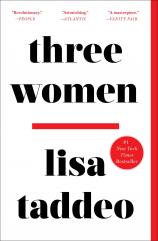Reading Group Guide
Discussion Questions
Three Women

1. In the author’s note, Lisa Taddeo explains the mechanics of her reporting and writing process for THREE WOMEN. How did knowing this information affect the way you read the book? Did it help to know how the book was researched before you started reading?
2. Why do you think we have such a difficult --- or uncomfortable --- time talking about women’s desire and women’s bodies, even in today’s otherwise open cultural discussions?
3. In the prologue, the author writes, “One inheritance of living under the male gaze for centuries is that heterosexual women often look at other women the way a man would” (page 2). Discuss this statement. In your experience, have you found this to be true or false? Assuming you believe this statement to be true or at least partially true, how does the notion of the inherited male gaze affect Lina, Sloane and Maggie’s desire and the actions they take to seize their desire?
4. The author spent a considerable amount of time speaking with men about desire before becoming so intrigued by the “complexity and beauty and violence” of female desire that she turned her focus exclusively to women. How would the book be different if men’s voices were included? Did you find yourself wondering what Lina or Sloane’s husbands were thinking, or what Maggie’s teacher taught? Discuss with your group whether men and women will read and respond to THREE WOMEN differently and, if so, how?
5. After years of research, interviews and embedding, the author made the decision to narrate much of THREE WOMEN in the third person and uses only the first person in the prologue and epilogue. At times during Maggie’s sections, she even switches to the second person (“you”), directly addressing the readers as if they are involved. How did the author’s decisions about point of view enhance or alter your understanding of these women and their stories? How would the book have been different if the author had chosen to insert herself into the women’s stories?
6. One thing that Lina, Sloane and Maggie have in common is the way they modify their behavior to fit the needs and desires of the partners they desire. How did it make you feel that these women had to change parts of themselves to try to gain love and acceptance from the ones they are with or the ones they desire? What does this say about power in relationships and the dynamics between men and women that we inherit and invent for ourselves? Have you ever experienced this in a relationship?
7. While Lina and Sloane are adults when they realize and act on their desires, Maggie is a high school student involved in an alleged relationship with a married teacher. Did you view Maggie’s story differently from those of her counterparts? What struck you most about her experience?
8. Maggie’s experiences not only upend her own life but also that of her entire community. Were you surprised by the outcome of the trial and the varying ways in which Maggie and her teacher each have to deal with the fallout from it? How did you feel about how strongly the community supported Maggie’s teacher?
9. At one point in her narrative, Lina explains that she fears being alone more than she fears death, which seems to inform a lot of her decisions. Do you agree with her? Why do you think that loneliness and not experiencing love frighten us so much?
10. Something that seems to follow Sloane are the expectations that others put upon her when it comes to her job, life partner, appearance, status and so on, which create a line she has to straddle. How does accommodating other people interfere with Sloane’s own needs and desires? Is there an overlap between her accommodation and her desires?
11. To some extent, the author’s goal in THREE WOMEN is to restore agency and power to women as they tell their stories. Do you think she succeeds? Why is it important that women feel empowered to tell their truths?
12. In your opinion, what shapes our views of sex and relationships most? Is it environment, past experience, the media, our families, our friends or something else? How does each of the three women’s lives influence her mindset? How have experiences from your past informed your adult life?
13. In the beginning and at the end of the book, the author recounts a story about her Italian mother and the man who used to follow her inappropriately. How does that anecdote set the tone for the book and carry throughout? What is the legacy of mothers and daughters when it comes to relationships, sex and desire, both in this book and in your own experiences?
14. In the prologue of THREE WOMEN, the author explains, “It’s relatability that moves us to empathize” (page 7). After reading the book, do you agree? How did you relate, or not, to Lina, Sloane and Maggie’s stories? Discuss as a group whether you empathize more or less with people you can relate to. Was your reading of the book affected by an ability to connect with Lina, Sloane or Maggie?
Three Women
- Publication Date: July 7, 2020
- Genres: History, Nonfiction, Social Sciences, Women's History, Women's Studies, Women’s Issues
- Paperback: 336 pages
- Publisher: Avid Reader Press/Simon & Schuster
- ISBN-10: 145164230X
- ISBN-13: 9781451642308







